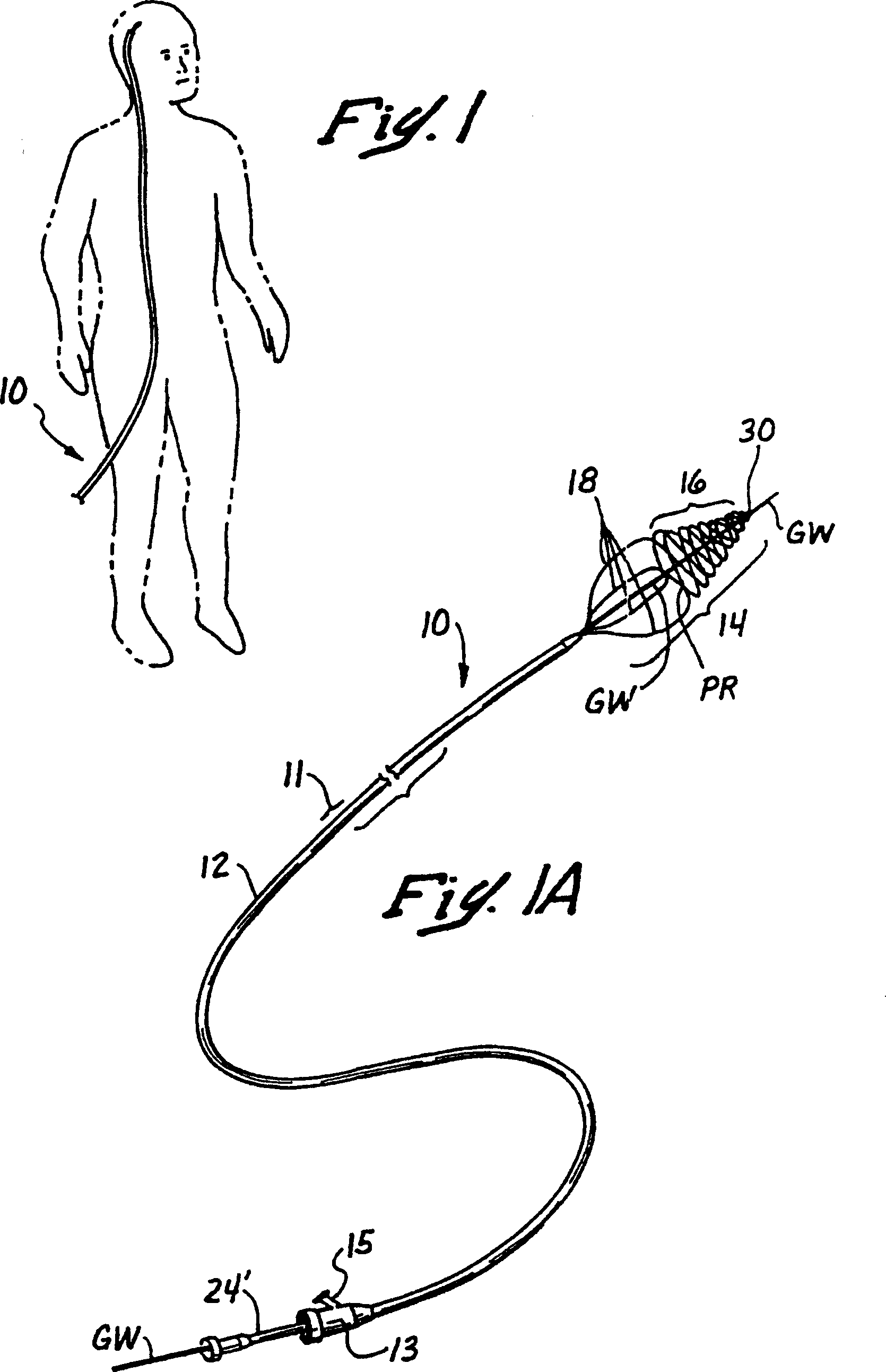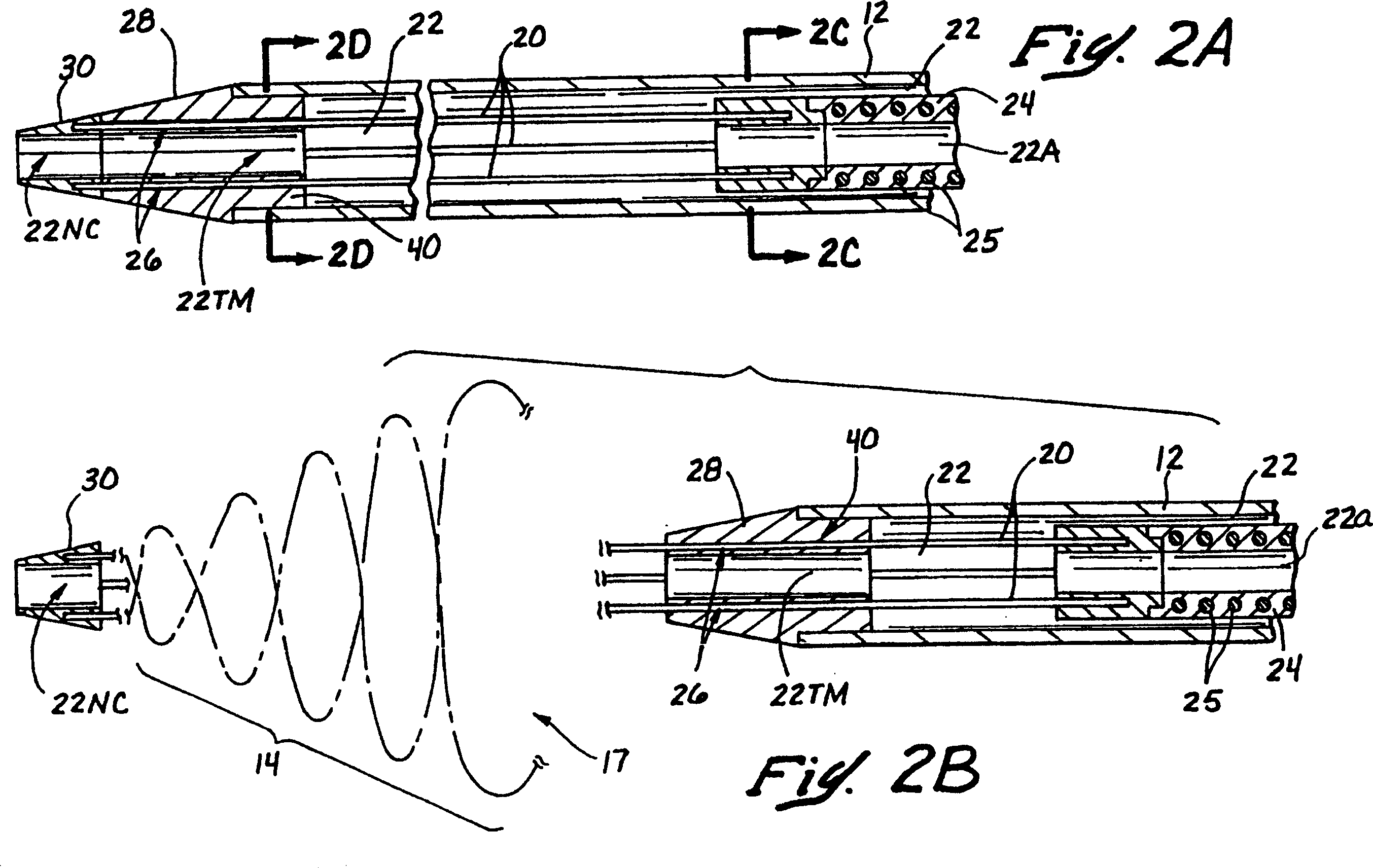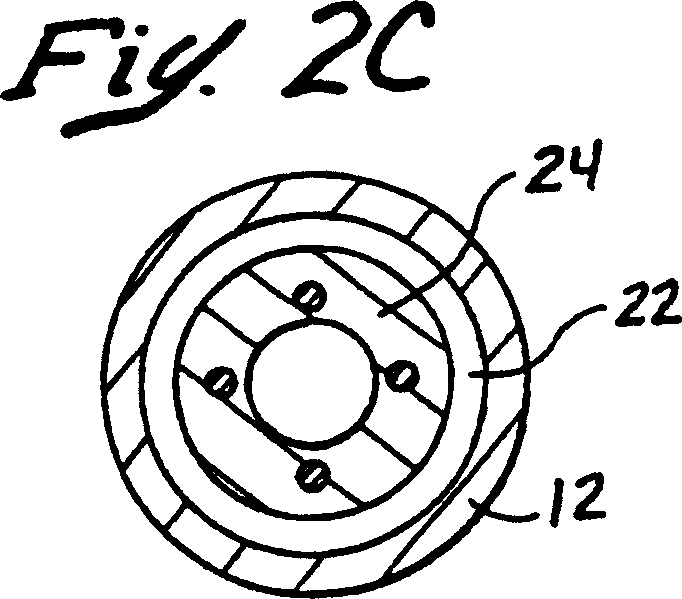Embolectomy catheters and method for treatment
A catheter and embolus technology, applied in the direction of catheters, balloon catheters, surgical cutting instruments, etc., can solve the problem that the embolus removal catheter is not designed
- Summary
- Abstract
- Description
- Claims
- Application Information
AI Technical Summary
Problems solved by technology
Method used
Image
Examples
no. 1 approach
[0118] As shown in Figures 1-2D, a first embodiment of a full-line catheter device 10 includes an elongated, flexible catheter 11 having a clot capture container deployable from its distal end DE. 14, as shown in the figure. The occluding material capture container 14 is formed by a plurality (e.g., two or more) of wire elements 20 that are initially collapsible into a substantially rectilinear configuration within the catheter 11 and positioned First (ie, loaded) position (see Figure 2A). When it is desired to deploy the obstructing material capture container 14, the preformed wire element 20 is held still while the catheter 11 is withdrawn, or the wire element 20 is advanced in the distal direction while the catheter 11 is not moved so that the wire Released from the constraints of the catheter 11 and elastically assumes a second (i.e., operable) configuration, in this configuration, the distal portion of the wire element forms an open proximal mouth or edge 17. The spiral...
no. 2 approach
[0124] Figures 3B and 3B' illustrate a second embodiment of a full line catheter set 10' which differs from the first embodiment 10 in several ways. For example, the blocking material capture container (not shown) of this second embodiment is made of only two (2) wire elements 20' instead of four (4) wire elements as in the first embodiment 10. production. Moreover, the catheter 11' of the second embodiment incorporates a reduced diameter, increased flexibility elongated tip portion 270—the same tip portion as commercially available microcatheters (e.g., Prowler®). TM Microcatheter, Cordis Endovascular System, Miami Lakes, Florida) similar, an example of such a distal portion is shown in Figure 3A, which generally includes a proximal portion PP with a lumen L and a distal portion 270 with a lumen 271 , the lumen 271 communicates with the lumen L of the proximal portion PP.
[0125] Referring to Figures 3B and 3B', a second embodiment of the full-line embolectomy catheter dev...
no. 3 approach
[0130] 3D and 3D' show a third embodiment (i.e., a quick-change embodiment) of an embolectomy catheter device 10", which is similar in structure to the second embodiment 10' described above, but which introduces a guidewire access opening 267' formed in the sidewall of the catheter 11' adjacent the distal end of the proximal portion 12' thereof, and a guidewire deflector tube 260 extending from the guidewire access opening 267' to the lumen 22' '. Guidewire deflection tube 260' has an expanded distal end that is held in place centrally within the lumen by a plurality of radial support elements 264'. Longitudinal passageways 266, 266(alt) are formed in radial support elements 264' between, so that radiographic contrast agent or other fluids flow through lumen 22', over the expanded distal end of guidewire deflection tube 260'. Some longitudinal passages 266 (alt) are selected to be larger than others 266 so that an obstruction is formed The elongate element 20' of the substance...
PUM
 Login to View More
Login to View More Abstract
Description
Claims
Application Information
 Login to View More
Login to View More - R&D
- Intellectual Property
- Life Sciences
- Materials
- Tech Scout
- Unparalleled Data Quality
- Higher Quality Content
- 60% Fewer Hallucinations
Browse by: Latest US Patents, China's latest patents, Technical Efficacy Thesaurus, Application Domain, Technology Topic, Popular Technical Reports.
© 2025 PatSnap. All rights reserved.Legal|Privacy policy|Modern Slavery Act Transparency Statement|Sitemap|About US| Contact US: help@patsnap.com



